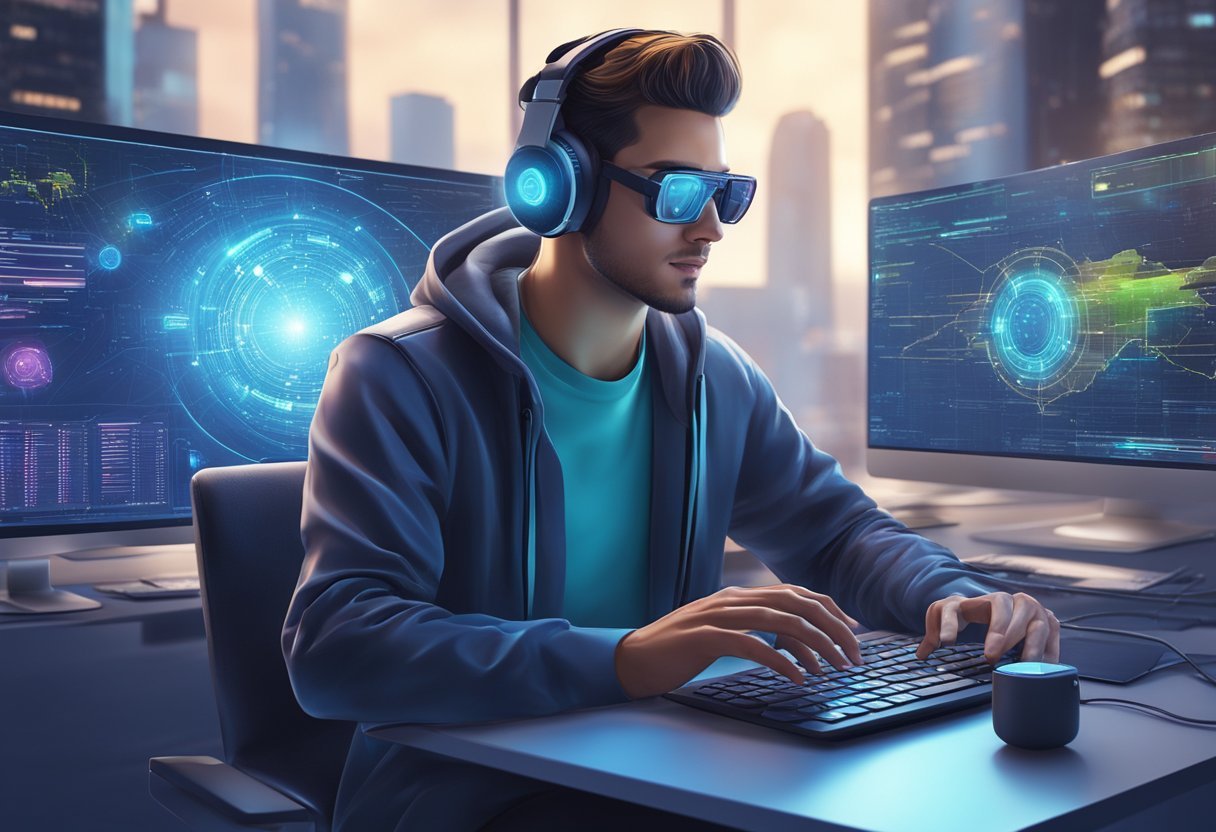Navigating copyright and intellectual property in the metaverse can be tricky, but understanding the basic legal principles of ownership and protection of creative works is essential for anyone who creates or sells content in the physical world. In this article, we’ll discuss some common legal issues related to copyright and intellectual property in the metaverse and how to navigate copyright and IP in the metaverse.
Key Takeaways:
- Understand your rights when it comes to copyright and intellectual property in the metaverse.
- Research local laws before using any copyrighted material in the metaverse.
- Obtain permission from the content owner before distributing any content in the metaverse.
- Respect fair use parameters when using copyrighted content, and properly cite your sources.
- Monitor for misuse of content you create or distribute in the metaverse.
- Consider having contracts with other parties involved in creating and distributing content in the metaverse.
- Use digital rights management systems and watermarking techniques to protect your work from piracy.
- Register trademarks associated with products and services in the metaverse with local authorities to help with trademark protection.
How to Navigate Copyright and Intellectual Property in the Metaverse
Understand your rights
Before you create or use any creative content in the metaverse, it’s important to understand what copyright laws and intellectual property, IP rights apply to you.
Research local laws
Copyright laws differ from country to country, so it is important to be aware of the laws in your jurisdiction before creating or using any copyrighted material.
Get permission
Make sure to obtain permission from the copyright holder or creator of any content you plan to use in the metaverse before distributing it. This includes obtaining a license if necessary.
Respect fair use
Be sure that your usage of copyrighted content falls within “fair use” parameters, which allows limited use of certain copyrighted works without permission from the owner.
Cite your sources
Be sure to properly cite any content you use in the metaverse, particularly if it comes from another source. This helps to ensure proper credit is given where due and reduces the risk of plagiarism.
Monitor for misuse
If you are creating or distributing content in the metaverse, it’s important to monitor for any misuse or copyright infringement. Taking prompt action to address any potential issues is key to protecting your rights.
Consider contracts
It may be beneficial to consider having a contract with any other party involved in the creation or distribution of content in the metaverse, such as joint venture partners or collaborators.
Protect against piracy
To reduce the risk of unauthorized use or piracy of content created in the metaverse, consider using digital rights management systems and watermarking techniques to protect your work.
Register trademarks
If you have a trademark or logo associated with a product or service in the metaverse, consider registering it with local authorities to help trademark protection against misuse.
Contact an attorney
If you are unsure of your rights or need assistance navigating copyright and intellectual property law in the metaverse augmented reality, it may be beneficial to contact a lawyer to get advice. This can help ensure that all parties involved understand their rights and obligations under applicable laws.
Importance of Copyright and Intellectual Property in the Metaverse
To protect your work
Copyright law helps to protect the rights of creators and owners of original works, such as artwork, music, books, software programs, virtual items, and other creative works. This ensures that the creator or owner of a work is properly compensated for their efforts.
To understand licensing rules
It’s important to understand how different types of creative works can be licensed and used and to ensure that you are not violating any copyright laws when using content from other sources.
To prevent misuse of your work
Copyright law helps to protect against the unauthorized use or distribution of someone else’s work by providing legal recourse for owners and creators if their work is misused.
To prevent plagiarism
Plagiarism is the act of stealing someone else’s work and claiming it as your own. This illegal activity can have serious consequences, so understanding copyright law and proper citation techniques is essential for anyone who creates or distributes content in the metaverse virtual world.
To protect yourself from liability
Copyright infringement can lead to legal action, including potential fines and damages. Understanding copyright law can help you avoid any potential liabilities.
To protect your brand
Copyright law helps to protect the trademarks, logos, digital assets, and other branding elements associated with a product or service from being misused by others in the metaverse virtual environments.
To encourage creativity
By understanding intellectual property rights, creators and brand owners are more likely to create something original and unique. This encourages creativity in the metaverse virtual reality, resulting in more innovative content for everyone to enjoy.
To promote fair use
Fair use is a legal concept that allows limited use of copyrighted material without requiring permission from the copyright holder. Understanding fair use helps to ensure that creators are not unfairly punished for using this type of content in their works.
Copyright and Intellectual Property Challenges in the Metaverse
Difficulty enforcing copyright laws
The decentralized nature of the metaverse virtual marketplace makes it difficult for copyright owners to enforce their rights, as enforcement requires additional resources and coordination across different jurisdictions.
Challenges with tracking content ownership
With so much digital content being created and shared in the metaverse virtual environment every day, it can be difficult to track who owns certain pieces of content. This can lead to potential copyright infringement and legal action if the content is used without permission.
Risk of piracy
The open nature of the metaverse virtual worlds also makes it easier for people to pirate copyrighted content such as software, virtual goods, music, or videos. It’s important to understand the implications of pirating digital content to avoid any legal repercussions.
Difficulty protecting intellectual property
Intellectual property rights are often difficult to enforce in the metaverse due to the decentralized nature of the platform and potential challenges with tracking ownership.
Misuse of trademarks and logos
It is not uncommon for unscrupulous individuals to misuse trademarks or logos to promote their products or services without permission.
Potential conflicts of interest
It is important to consider potential conflicts of interest that may arise when using content created by another party in the metaverse. This includes ensuring that all parties involved are properly compensated and credited for their work.
Lack of clarity regarding local laws
With different countries having different copyright laws, it can be difficult to understand the implications of using content across jurisdictions.
This can be especially tricky when it comes to protecting intellectual property rights in different countries.
Difficulty accessing copyrighted content
Copyright law restricts access to certain types of works, meaning that some content may not be available due to legal restrictions. It’s important to be aware of these laws to avoid any potential copyright infringement.
Difficulty distinguishing between original and duplicate content
In the metaverse, it can be difficult to differentiate between an original work of art or literature and a copy created by someone else.
This can lead to potential copyright infringements if someone uses another’s work of art without permission.
Intellectual Properties to Look for in the Metaverse
1. Patents: In the metaverse, patent protection can be used to protect inventions related to software or technology to prevent others from using or copying them.
2. Copyrighted works: Creative works such as literature, art, and music are all protected by copyright law and must not be used without permission of the copyright holder.
3. Trademarks: Businesses or individuals can use trademark law to protect their brand and logo from unauthorized use in the metaverse digital world.
4. Trade secrets: Companies may choose to keep certain proprietary information or processes secret, and will need to take steps to protect this intellectual property from being shared by others.
5. Designs: Designers can protect their designs, such as logos or website layouts, through copyright law in the metaverse virtual space.
6. Industrial designs: Industries whose products involve a new appearance may be able to protect these aspects through industrial design rights.
7. Public domain works: It is important to distinguish between public domain works, which are not protected by copyright and can be freely used, and works that are subject to copyright protection and IP protection.
8. Personality rights: In some cases, individuals may have the right to control how their names or likenesses are used in the metaverse.
9. Licensing agreements: Companies may choose to use licensing agreements to protect content created by another party in exchange for payment or other benefits. This is an important aspect of intellectual property protection in the metaverse.
Bottom Line
Understanding and adhering to copyright and intellectual property laws in the metaverse is essential for anyone creating or using content there.
It is important to be aware of the legal implications of using copyrighted material, including obtaining permission where necessary and taking steps to protect your works from misuse.
It’s important to consider potential conflicts of interest that may arise when using intellectual property in the metaverse and to be aware of any laws or regulations that may apply.
Doing so can help ensure a successful experience in the metaverse without risking infringement of any rights.




